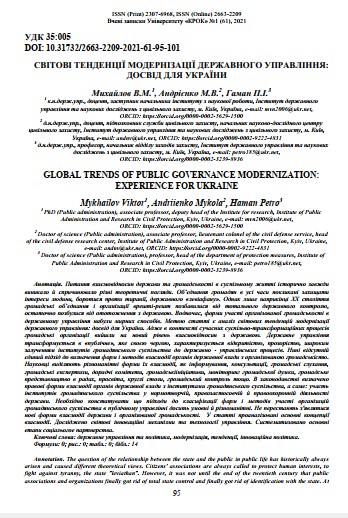GLOBAL TRENDS OF PUBLIC GOVERNANCE MODERNIZATION: EXPERIENCE FOR UKRAINE
DOI:
https://doi.org/10.31732/2663-2209-2021-61-95-101Keywords:
public administration and policy, modernization, trends, innovation policyAbstract
The question of the relationship between the state and the public in public life has historically always arisen and caused different theoretical views. Citizens' associations are always called to protect human interests, to fight against tyranny, the state "leviathan". However, it was not until the end of the twentieth century that public associations and organizations finally got rid of total state control and finally got rid of identification with the state. At the same time, forms of organized public participation in public administration have become peaceful. The aim of the article is to analyze global trends in public administration modernization: experience for Ukraine. After all, in the context of modern social and transformational processes, public organizations have reached a new level of relations with the state. Public administration is transformed into "public", which in turn is characterized by openness, transparency, broad involvement of civil society institutions in public administration processes. Currently, there is no single approach to determining the forms and methods of interaction between public authorities and the organized public. Scholars identify various forms of their interaction, such as information, consultation, public hearings, public examinations, advisory committees, public initiatives, public opinion monitoring, public representation on councils, education, round tables, public control, and more. The legislation defines the legal forms of interaction of public authorities with civil society institutions, namely: the participation of civil society institutions in law-making, law enforcement and law enforcement activities of the state.It should be noted that approaches to the classification of forms and methods of participation of civil society organizations in public administration are quite conditional and diverse. New forms of interaction between the state and the organized public do not cease to appear. The article analyzes the basic concepts of interaction. The world innovative mechanisms and management technologies are studied. The main stages of social partnership are systematized.
Downloads
References
Vigoda E. From Responsiveness to Collaboration: Governance, Citizens, and the Next Generation of Public Administration. Public Administration Review. 2002. Vol. 62. № 5. Р. 527-540.
Якубовський О. П., Бутирська Т. О. Державна влада i громадянське суспiльство: система взаємодiї: монографія. Одеса : ОРIДУ НАДУ, 2004. 196 с.
Основи публiчної полiтики та управлiння / за заг. ред. С. О. Телешуна. Київ : НАДУ, 2011. 312 с.
Паливода Л., Голота С. Стан та динамiка розвитку неурядових органiзацiй України 2002–2010 роки : звiт за даними дослiдж. Київ : ТОВ “Видавн. Дiм “КуПол”, 2010. 118 с.
Гудима Н. Принципи вiдкритостi i прозоростi та їх реалiзацiя в державному управлiннi. Вiсник НАДУ. 2005. № 3. С. 77–85.
Колодiй А. Ф. На шляху до громадянського сусп iльства. Теоретичнi засади й соцiокультурнi передумови демократичної трансформацiї в Українi: монографiя. Львiв: Червона Калина. 2002. 276 с.
Головатий М. Полiтико-правовi аспекти взаємодiї демократичної держави й громадянського суспiльства. Суспiльнi реформи та становлення громадянського суспiльства в Українi. 2001. Т. 1. С. 25-26.
Лациба М. Державне регулювання та стан розвитку громадянського суспiльства в Українi. Прiоритети розвитку громадянського суспiльства України. 2008. С. 15–31.
Жовнiрчик Я. Ф. Напрямки оптимiзацiї взаємовiдносин органiв публiчної влади та iнститутiв громадянського суспiльства. Науковий вiсник Академiї мунiципального управлiння. Серiя : Управлiння. 2013. Вип. 4. С. 25–32. URL: http://nbuv.gov.ua/j - pdf/Nvamu_upravl_2013_4_5.pdf.
Даудова Г. В. Взаємодiя держави i громадянського суспiльства: європейський досвiд. URL: http://www.kbuapa.kharkov.ua/e - book/db/2014 - 1/doc/4/01.pdf.
Лiткевич В. С. Становлення та сучасний розвиток взаємодiї Української держави з громадянським суспiльством. Стратегiчнi прiоритети. 2014. № 1. С. 18- 23.
Шаров Ю. П. Стратегiчне планування в мунiципальному менеджментi: концептуальнi аспекти : монографiя. Київ : УАДУ, 2001. 302 с.
Поляков В. Ю. Cпiввiдношення понять некомерцiйних та неприбуткових організацій. Європейськi перспективи. 2011. № 1. С. 46-51.
Ротар Н. Дiалоговi форми полiтичної участi : передумови та перспективи становлення в Українi. Полiтичний менеджмент. 2007. № 1. С.75- 92.



